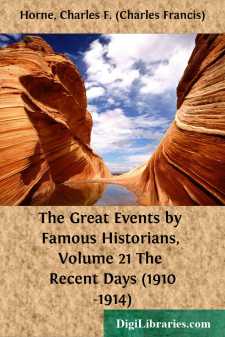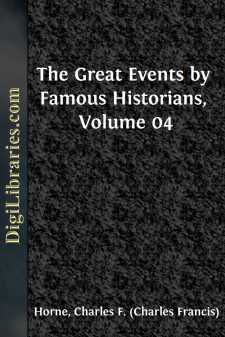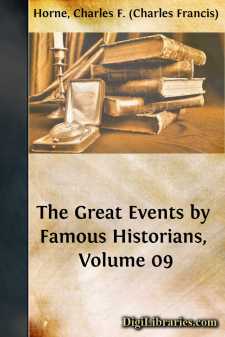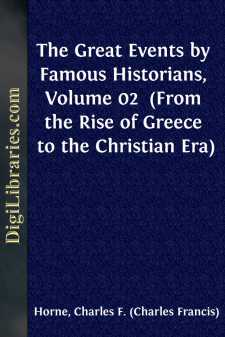Categories
- Antiques & Collectibles 13
- Architecture 36
- Art 48
- Bibles 22
- Biography & Autobiography 813
- Body, Mind & Spirit 142
- Business & Economics 28
- Children's Books 17
- Children's Fiction 14
- Computers 4
- Cooking 94
- Crafts & Hobbies 4
- Drama 346
- Education 46
- Family & Relationships 57
- Fiction 11829
- Games 19
- Gardening 17
- Health & Fitness 34
- History 1377
- House & Home 1
- Humor 147
- Juvenile Fiction 1873
- Juvenile Nonfiction 202
- Language Arts & Disciplines 88
- Law 16
- Literary Collections 686
- Literary Criticism 179
- Mathematics 13
- Medical 41
- Music 40
- Nature 179
- Non-Classifiable 1768
- Performing Arts 7
- Periodicals 1453
- Philosophy 64
- Photography 2
- Poetry 896
- Political Science 203
- Psychology 42
- Reference 154
- Religion 513
- Science 126
- Self-Help 84
- Social Science 81
- Sports & Recreation 34
- Study Aids 3
- Technology & Engineering 59
- Transportation 23
- Travel 463
- True Crime 29
Charles F. (Charles Francis) Horne
Charles Francis Horne was an American author and editor born in 1870, notable for his extensive work in compiling historical texts and literary anthologies. He is best known for his multi-volume series, "The Great Events by Famous Historians," which offers a comprehensive collection of significant historical narratives. Horne's work has been influential in making historical and literary knowledge more accessible to the general public.
Author's Books:
Sort by:
"After us, the deluge!" said Louis XV of France. He died in 1774, and the remaining quarter of the eighteenth century witnessed social changes the most radical, the most widespread which had convulsed civilization since the fall of Rome. "As soon as our peasants seek education," said Catharine II of Russia to one of her ministers, "neither you nor I will retain our places."...
more...
CHARLES F. HORNE It is related that in 1661, on the day following the death of the great Cardinal Mazarin, the various officials of the State approached their young King, Louis XIV. "To whom shall we go now for orders, Your Majesty?" "To me," answered Louis, and from that date until his death in 1715 they had no other master. Whether we accept the tale as literal fact or only as the...
more...
Some of Arnold's biographers have declared that he was a very vicious boy, and have chiefly illustrated this fact by painting him as a ruthless robber of birds'-nests. But a great many boys who began life by robbing birds'-nests have ended it much more creditably. The astonishing and interesting element in Benedict Arnold's career was what one might term the anomaly and incongruity...
more...
AN OUTLINE NARRATIVE TRACING BRIEFLY THE CAUSES, CONNECTIONS, AND CONSEQUENCES OF THE GREAT EVENTS THE RECENT DAYS (1910-1914) CHARLES F. HORNE The awful, soul-searing tragedy of Europe's great war of 1914 came to most men unexpectedly. The real progress of the world during the five years preceding the war had been remarkable. All thinkers saw that the course of human civilization was being...
more...
CHARLES F. HORNE Our modern civilization is built up on three great corner-stones, three inestimably valuable heritages from the past. The Græco-Roman civilization gave us our arts and our philosophies, the bases of intellectual power. The Hebrews bequeathed to us the religious idea, which has saved man from despair, has been the potent stimulus to two thousand years of endurance and hope. The Teutons...
more...
THE GREAT EVENTS (THE REFORMATION: REIGN OF CHARLES V) CHARLES F. HORNE Our modern world begins with the Protestant Reformation. The term itself is objected to by Catholics, who claim that there was little real reform. But the importance of the event, whether we call it reform or revolution, is undenied. Previous to 1517 the nations of Europe had formed a single spiritual family under the acknowledged...
more...
With the death of Sardanapalus, the great monarch of Assyria, and the taking of Nineveh, the capital city, by the Medes, the kingdom of Assyria came to an end, and the vast domain was parcelled out among the conquerors. At the time of the catastrophe, the district of Babylonia, with its capital city Babylon, was ruled as a dependent satrapy of Assyria by Nabopolassar. Aided by the Medes, he now took...
more...
B.C. 413SIR EDWARD SHEPHERD CREASYThat great writer of the history of the Romans, Thomas Arnold, says of the defeat of the Athenian fleet at Syracuse: "The Romans knew not, and could not know, how deeply the greatness of their own posterity, and the fate of the whole western world, were involved in the destruction of the fleet of Athens in the harbor of Syracuse. Had that great expedition proved...
more...
The poems of Homer differ from all other known poetry in this, that they constitute in themselves an encyclopædia of life and knowledge at a time when knowledge, indeed, such as lies beyond the bounds of actual experience, was extremely limited, but when life was singularly fresh, vivid, and expansive. The only poems of Homer we possess are the "Iliad" and the "Odyssey," for the...
more...
Phidias, one of the greatest sculptors the world has seen, and whose name has become, as it were, the synonym of his art, was born at Athens about 500 B.C. He belonged to a family of artists, none of whom indeed were distinguished in their profession, but their varied occupations furnished the atmosphere in which such a talent as that of Phidias could best be fostered and brought to maturity. His...
more...











